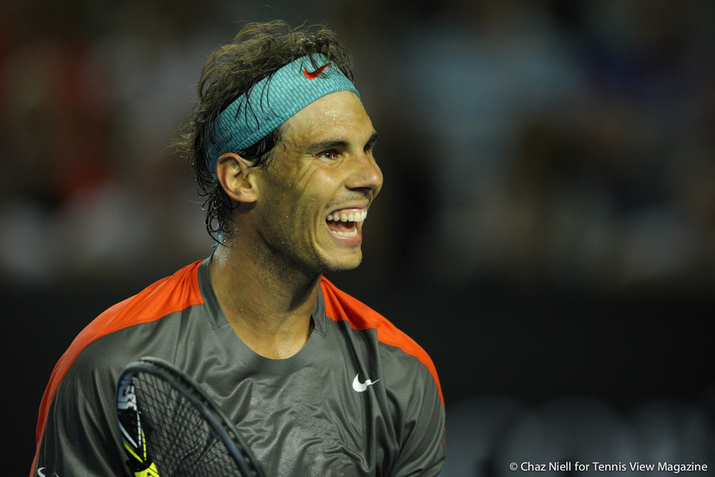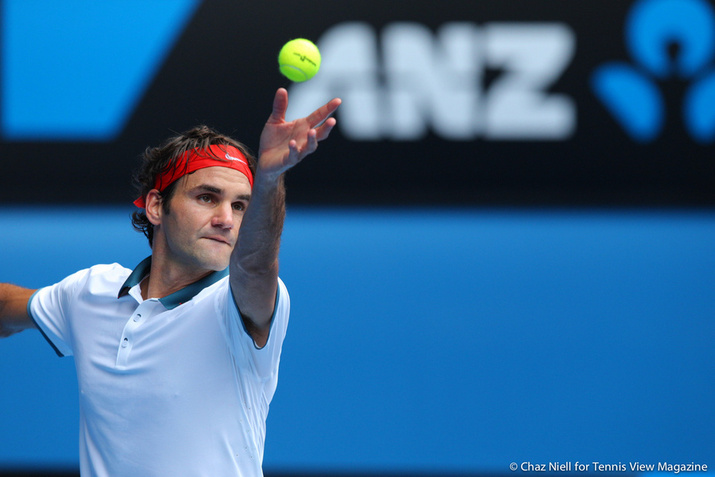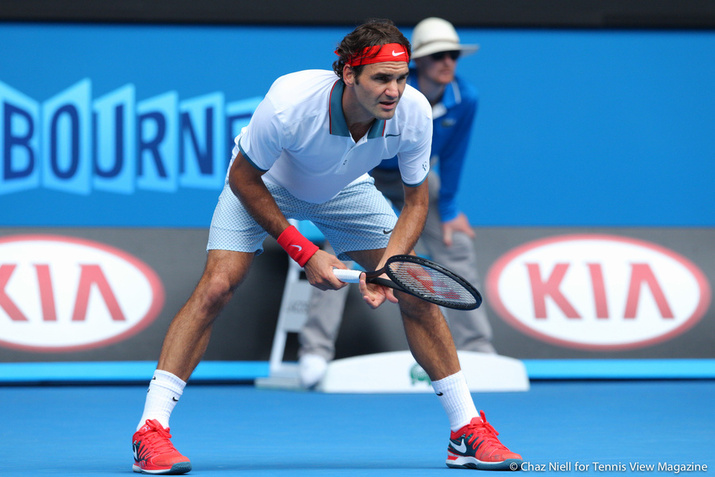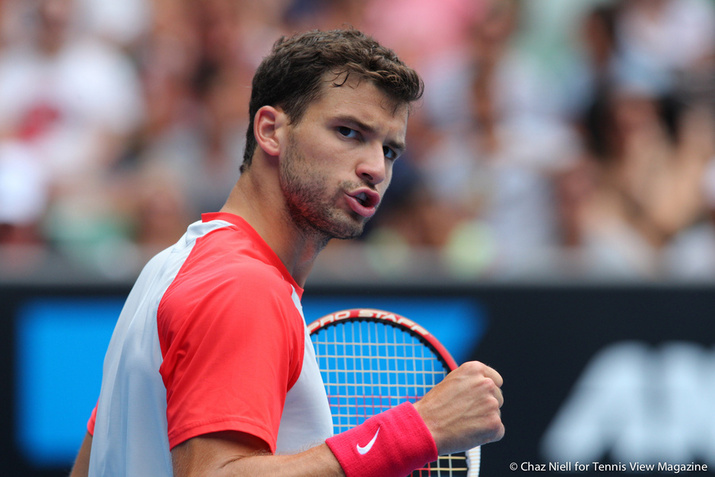Don't miss any stories → Follow Tennis View
FollowFederer, Nadal Edge Closer to Semifinal Showdown
After two monumental upsets in 24 hours on the women’s side of the draw, the Melbourne crowds weren’t sure what to make of the men’s fourth rounds. In the afternoon match on Rod Laver Arena, Japan’s golden boy Kei Nishikori was attempting to climb the metaphorical Mt. Everest against world No. 1 Rafael Nadal. Winning the exhibition at Kooyong before the Australian Open and navigating his way safely through the earlier rounds, Nishikori would have been confident heading into his match-up against the top seed. Meanwhile, the world No. 1 had an almost flawless run to this point of the tournament and would have been looking for a test to appropriately prepare him for the later rounds.
Well, he got one after Nishikori did everything but win the match. He was aggressive; he played an extremely positive game, and the quality he produced definitely justified his world ranking. With a compact style, the world No. 16 was clean and efficient in earning 10 break points and breaking the Spaniard four times in the match. While he played an aggressive style, Nishikori still appeared to play within himself, which is why he was able to remain at such a high level during the match.

The phrase “big point players” is used often, but it is extremely relevant to this match. In earning eight break points, Nadal was able to convert five of them and was able to save six against his serve. And this reflected the tone of the match as Nishikori continually pounded Nadal on both wings but was unable to break him down, and Nadal produced the winner when it counted. The world No. 1 was also extremely efficient, making 36 winners to just 28 errors. Unfortunately this winner to unforced error disparity underlines the gap between the top five men to the rest. And it was the difference with Nishikori, who hit 36 winners but canceled them out with 51 unforced errors. Considering his aggressive brand of tennis, his high unforced error count was inevitable, but it made the difference in a 7-6 7-5 7-6 loss.
What was impressive about the 24-year-old was that he was able to sustain the intensity for three hours and 17 minutes. While pushing Nadal to two tie-breaks, Nishikori acknowledged that Nadal elevated his intensity when he needed to.
“It's really disappointing because I had some chances to at least get one set and I couldn't,” Nishikori said. “Both tiebreaks he was playing much better. He raised his level and he was playing good. A couple points were amazing. I thought I was playing good. Some important points I couldn't win. If I win them, then the games can change completely.”
Nadal was quick to heap praise on Nishikori for the way he played but recognized that he played the big points slightly better than the 16th seed.
“Kei played a fantastic match, in my opinion. Just a few mistakes in some moments that were the tough ones,” Nadal said frankly. “But for the rest, he played very aggressive, he went for the shots. He came on court with determination to take the ball very early and go for the winners. He really had the right feelings to do it. So it was a tough match, a very important win.”

The next match on Rod Laver Arena was the one that everyone was waiting for, Roger Federer taking on crowd favorite Frenchman Jo-Wilfried Tsonga. With both having solid performances in the earlier rounds, no one knew what to expect from this match that promised to be one of the matches of the tournament so far.
It was undoubtedly one of Federer’s best matches for the past three years and one that Tsonga would perhaps rather forget. After having his serve broken in the second game of the match, Tsonga became a mere spectator. Federer was simply sublime in his complete dismantling of the 10th seed. It was Roger Federer circa 2006-2007. From stepping in and taking the return on the rise to making drop shot winners at will to pounding the Tsonga backhand on approaches, Federer was unstoppable. The 6-3 7-5 6-4 demolition of the Frenchman was completed in under two hours.
To give an idea of the dominance enjoyed by the sixth seed, he hit 43 winners to just 21 unforced errors. He won 88% of his first serves, and he came to the net 41 times while winning 34 of those points, showing the positive influence from his new coach Stefan Edberg. Federer earned seven break points, of which he converted three. And to break three times was all he needed as he slammed the door shut on yet another disappointing Australian Open campaign for Tsonga, who has yet to taste victory against Federer at Melbourne Park.
In all fairness, Tsonga didn’t play a bad match. He hit more winners than he did unforced errors. But he was just dominated by a player who has made a realistic case for the title at Melbourne Park this year. It was a desolate Tsonga in the post-match press conference.
“I had a good opponent today,” he reflected. “I couldn’t enter my match. Then everything was going so quick. He was playing unbelievable. And I was not enough good to destabilize him. And that's it.”
In calling the press conference 15 minutes after the final point of the match was played, making his desire to leave quickly known, it was hard not to feel sympathetic for the enigmatic Frenchman. “For the moment I will go back home, try to enjoy people around me, and that's it. Then I will look forward to the Davis Cup, which is going to be on clay,” Tsonga said.

On the other hand, Federer was ecstatic with his win. “I'm very pleased. I don't think I got broken today,” he remarked. “Against a great player, I'm extremely happy how things went for me tonight. I was able to play my game, offensive, mix it up, and come to the net. I was surprised that things worked out for me.”
He reflected on his game style, which was supremely effective against the 10th seed. “The question is can you then do it,” referring to his net game. “Does Jo allow you to? Is he serving too big? Are you going to serve and volley? How is he returning? It depends a little bit how the match goes. I was hoping I could play a little bit aggressive. So I think it worked out better than I thought it would. I was good at net. I was consistent. I was solid. I was quick. I had the right mindset. I think the plan definitely worked out well.”
In a match that slipped slightly under the radar after Sharapova’s upset and Nadal’s duel with Nishikori, Grigor Dimitrov achieved his first quarterfinal appearance at a major. Taking on giantkiller Roberto Bautista Agut of Spain, who eliminated Juan Martin Del Potro in the second round, Dimitrov was the clear favorite to make it through.
In a 6-3 3-6 6-2 6-4 victory, Dimitrov his 38 winners and made 34 unforced errors in a clean and disciplined match. His relationship seemingly flourishing with Australian coach Roger Rasheed, Dimitrov showed maturity in dispatching the lesser known Bautista Agut in two hours and 24 minutes. It was exciting for the packed Margaret Court Arena as the 22nd seed showed signs that he may yet fulfill expectations and reach his potential.

In his post-match press conference, Dimitrov reflected on the patience that he’s tried to bring to his game and his career. “I think most of the time patience is key in general, not only in sports, but I think in life,” a philosophical Dimitrov stated. “This is what I always wanted to do, is to play tennis. You have to be patient. I started playing tennis really early. This is what I've always wanted to do. So whether I like it or not, the patience is one of the main ingredients to become good.”
And he was looking forward to the clash with Nadal. “We all know that he has won tons of slams. He's been a tremendous competitor. He's Rafa. We all know him,” Dimitrov said. “That's what I'm playing for, to put myself in the position to play those guys. I had tough battles with him in the past. Played a couple times on clay. There were always little things missing. But I'm quite happy with the way I'm performing so far. So I like my chances.”










